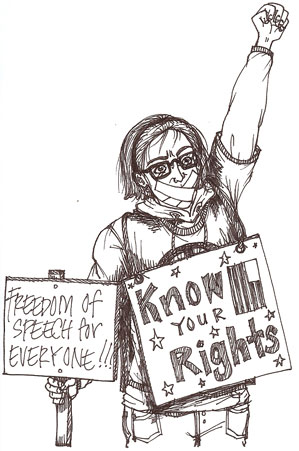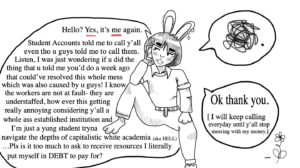On March 4, thousands of students from all across the state came together to speak out against recent budget cuts. This day of protests highlighted the importance of free speech on college campuses.
According to a national poll, only four percent of U.S. citizens can name all five First Amendment rights. It is more than likely many Mills College students are not aware of their Constitutional freedoms. Most are probably not aware that California law requires that the First Amendment be upheld in private colleges, according to California Education Code Section 94367.

Code Section 94367, known as the Leonard Law, states that “no private post-secondary institution shall make or enforce a rule subjecting a student to disciplinary sanctions solely on the basis of conduct that is speech or other communication…”
This means that no student at Mills can be punished for what they say on campus.
California is the only state to have such a law, so why do some students act like the administration can control what is said, posted or written on campus? Why aren’t more students taking advantage of this right?
Just for reference, the five First Amendment rights are freedom of speech, freedom of the press, freedom of religion, freedom of assembly and the right to petition the government.
Recent events such as the March 4th day of protest highlight the importance of freedom of speech, freedom of assembly, and right to petition the government.
Similarly, the upcoming 20th anniversary of the Strike show how much student dissent can change an administration.
Campanil editors have been brainstorming ways to promote the First Amendment on campus for some time, and not only for our own sake in protecting freedom of the press. This week marks our first ever First Amendment week. You’ll find us tabling out in Adam’s Plaza with resources and activities. We hope to empower students to stick up for themselves both now and as they move on in their lives.
This decision was recently solidified after Campanil reporters were turned away from a public meeting because they wanted to live-stream the event online. If a meeting is advertised as being open to everyone, why can’t those who were unable to attend in person view the proceedings?
It is about providing services to our community. Yet officials insisted that even though the meeting was “public” it could not be videotaped because doing so would inhibit participants from speaking openly. They also told reporters that the meeting could not be photographed and the names of those who spoke could not be used.
In this issue you will also notice an in-depth look at the role of the Board of Trustees. In the recent past students seem to be cut off from the Board, and we want to offer a more transparent view of the main governing body at Mills.
While this particular occurrence also involves issues of an emerging technological landscape where the Internet has in effect burst open the Mills “bubble,” in our mind this was also a clear violation of both the First Amendment and Leonard Law.
Every Mills student should know that they have a voice on campus and not be complacent in their involvement with the college. Each person in the Mills community should work to uphold their First Amendment rights.



